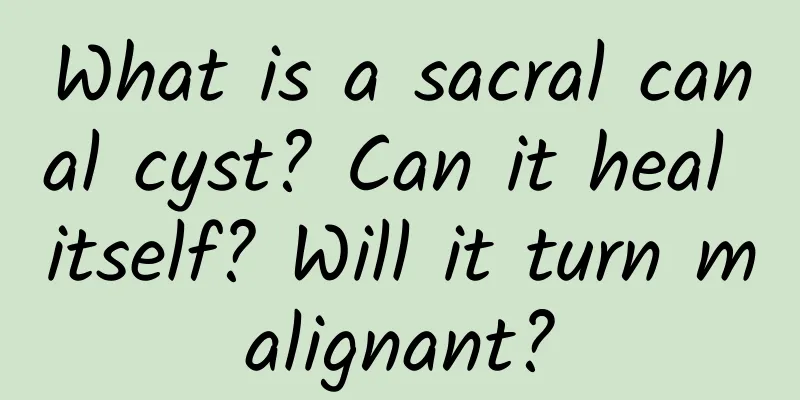What is a sacral canal cyst? Can it heal itself? Will it turn malignant?

|
This is the 2678th article of Da Yi Xiao Hu In the outpatient clinic, we often encounter patients who come to the clinic for low back pain. Some of them are diagnosed with herniated disc, some with lumbar muscle strain, and some with spinal stenosis. After the MRI examination, the report shows "sacral canal cyst" in addition to other diagnoses. Many patients are unfamiliar with this term, and almost everyone will ask: "What is a sacral canal cyst? Does it cause symptoms? Do I need surgery? Will it be absorbed and disappear by itself? Will it turn into cancer?" In fact, sacral canal cysts are not uncommon, but MRI examinations were not popular in the past, so they were not easy to be discovered. Sacral canal cysts, as the name implies, are cystic tumors located in the sacral canal. In fact, there is not a single type of cyst, and so far there are at least four types. Most cysts are single, and a few are multiple. The most common sites of disease are sacral 2 and sacral 3. Most of them have no clinical symptoms and are only discovered accidentally during imaging examinations. Since the widespread use of magnetic resonance imaging in clinical practice, the detection rate of sacral canal cysts has become increasingly higher, causing great concern among patients. Why does a sacral cyst occur? The pathogenic factors of sacral canal cysts are still unclear. It is generally believed that they are related to congenital developmental abnormalities and acquired secondary trauma, inflammation, etc. The theory of congenital factors combined with the "ball valve" of unidirectional flow of cerebrospinal fluid is more recognized by everyone. The simple explanation is that cerebrospinal fluid enters the cyst cavity when the pressure is high (coughing, exertion), and the outflow is blocked. Eventually, due to the poor outflow, it accumulates and gradually expands. Do you need treatment? Asymptomatic sacral canal cysts do not require any treatment and can be treated with close observation. Symptomatic cysts should be treated with surgery after excluding disc herniation, spinal stenosis or tumors in the sacral canal. What situations require surgery? Generally speaking, surgical treatment is feasible in the following situations: low back pain or intermittent claudication that is not responsive to conservative treatment and affects normal life or work; low back pain accompanied by decreased muscle strength and sensation in the lower limbs; perineum pain or decreased sensation, urinary or sexual dysfunction. The operation should be performed under a microscope to trim the cyst wall into shape. Use microscissors to sharply remove the cyst wall, find the cerebrospinal fluid leak, and suture it closed with vascular anastomosis lines. Will it go away or be absorbed on its own if not treated? Will it turn into cancer over time? Sacral canal cysts are meningeal cysts. Although they have the word "swollen" in their name, they are not tumors and have no possibility of malignant transformation. Because the cerebrospinal fluid in the cyst is difficult to drain out, it is difficult for it to disappear on its own. The most likely possibility is that it will remain unchanged for many years. Some cysts will gradually grow larger and eventually develop neurological symptoms. In short, sacral canal cysts are very common, but the cause is unknown and there are currently no preventive measures. Generally, there are no clinical symptoms, it is difficult to be absorbed or disappear on its own, and it will not become cancerous, so there is no need to have too many psychological concerns. If obvious clinical symptoms appear, surgical treatment should be performed in time. Currently, the most reasonable and reliable treatment is still mainly microsurgery. Author: Department of Traumatology and Orthopedics, Xinjiang Military Region General Hospital Guo ShuzhangChief Physician |
<<: What is the elegant name for makeup in ancient times? Can you bring cosmetics on an airplane?
>>: "In the Name of Family": What can I do to save you, your pointed front teeth
Recommend
What are some tips for girls to relieve urinary urgency?
Women's urgency to urinate may be caused by i...
Bringing new possibilities to cancer care! The world's first full-slice digital pathology model is released
Contributing author: Xu Hanwen (second-year docto...
Is boredom a good thing?
Leviathan Press: Poet Brodsky once wrote an artic...
What are the methods for gynecological chlamydia examination?
Gynecological chlamydia examination is a routine ...
What should I do if I have sex right after a miscarriage?
If a woman fails to conceive in the early stages ...
My husband couldn't help it when I was two months pregnant.
Some female friends who are two months pregnant w...
What should I do if I have no breast milk during confinement?
It is really painful for a mother to have no milk...
Which snacks are better for breast enhancement?
Girls all want to have plump breasts, and a curvy...
Normal age of cervical atrophy
In daily life, many women often suffer from some ...
Will you feel anxious when you are pregnant?
Everyone knows that when a woman becomes pregnant...
What are the symptoms of breast nodules?
Women's breasts may have various diseases, an...
Ultrasound examination at 37 weeks of pregnancy
We all know that it is very difficult for every p...
High intraocular pressure = glaucoma? Or maybe...
"Doctor, my eyes are sore and swollen. The e...
What is the reason for a small amount of bleeding after menstruation?
A small amount of bleeding after menstruation may...
What should pregnant mothers pay attention to in the late pregnancy
In the late pregnancy (generally 28 to 40 weeks o...









